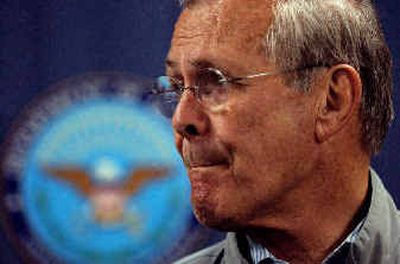Intelligence failed, Rumsfeld says

ABOARD THE USS ESSEX – Defense Secretary Donald H. Rumsfeld told sailors and Marines aboard this helicopter carrier today that the terrorist attacks of Sept. 11, 2001, could have been stopped if U.S. intelligence had penetrated the small group that planned and carried them out.
“We did not have a source inside the group of people that had planned and executed those attacks,” he said during a question-and-answer session with Marines and sailors aboard the USS Essex at port in Singapore.
“Had we had a source inside there, we undoubtedly would have been able to stop it,” Rumsfeld said, apparently referring to the al Qaeda network. “We did not.”
Rumsfeld did not mention CIA Director George Tenet, whose retirement was announced Thursday, but said it would have been a “big order” for American intelligence agencies to penetrate every conceivable hostile terrorist organization.
The defense secretary also was asked about the government’s recent warnings that a terrorist attack could happen this summer in the United States.
“The threat level suggests a good deal of interest on the part of terrorists in attacking the United States,” he said, adding he would not predict that an attack would happen.
Earlier, Rumsfeld told reporters the United States will make fundamental changes in its troop presence on the Korean Peninsula as well as in Europe, where U.S. defenses have stood guard against threats that have disappeared or no longer require such a large force.
“It’s time to adjust those locations from static defense to a more agile and a more capable and a more 21st century posture,” Rumsfeld said.
During a news conference aboard an Air Force E-4B modified 747 jumbo jet, which serves as a flying national command post equipped for use in wartime, Rumsfeld spoke on a variety of topics. They included the conflict in Iraq and his hope that more countries would decide to send troops to help the United States stabilize the country.
Rumsfeld chided critics who say the lack of stability raises the possibility of the Iraq war’s ultimate failure.
“People who look at it and say, ‘Oh, my goodness it’s untidy and it’s ugly and it’s dangerous,’ ought to look at history. It’s always been untidy and ugly and dangerous” when people who are used to being ruled are given a chance to build a democracy, he said.
Some in Asia have expressed concerns that removing 3,600 U.S. troops from Korea for use in Iraq – and possibly several thousand more at a later time – would be seen by communist North Korea as a sign of American weakness. Rumsfeld said such an interpretation would be mistaken.
“This country will not weaken the deterrent or the defense capabilities that we have, even though numbers and locations may shift and evolve as technologies evolve and as circumstances change,” he said. “We have been for a long time, in effect, where we were when the Cold War ended.”
There are about 37,000 U.S. troops in South Korea, about 47,000 in Japan and about 100,000 in Europe.